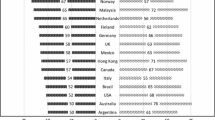Abstract
British universities differ considerably in the strength of their research orientation. Those of higher prestige tend to have a stronger orientation towards research, while those of lower prestige have a weaker research orientation, A university that is strongly research oriented in one group of subjects is likely to be so in the others it teaches too. It is the conventional wisdom that a good researcher is likely to be a good teacher at undergraduate level, and the negative relationship between the degree of research orientation and undergraduate wastage rates provides some slight support for this. The relationship between research and teaching seems to be more an indirect one (that anyone with the ability to do good research is likely to have the ability to teach well at university level) than a direct one (research makes a university teacher a better teacher).
Similar content being viewed by others
References
Cartter, A. M. (1966). An Assessment of Quality in Graduate Education. Washington: American Council on Education.
Cole, S., and Cole, J. R. (1966). “Scientific Output and Recognition: A Study in the Operation of the Reward System in Science,” American Sociological Review. 377–390.
Cole, S. (1970). “Professional Standing and the Reception of Scientific Discoveries,” American Journal of Sociology. 76, 2, 286–306.
Committee of Vice-Chancellors and Principals of the Universities of the United Kingdom (1972). Report of an Enquiry into the Use of Academic Staff-Time. London, Committee of Vice-Chancellors.
Committee on Higher Education (Robbins Committee) (1963). Report, Cmnd. 2154. London, HMSO.
Cox, R. (1967). “Examinations and Higher Education: A Survey of the Literature,” Universities Quarterly. 21, 292–340.
Department of Education and Science. Statistics of Education (1969). 5 (Finance and Awards).
Halsey, A. H., and Trow, M. (1971). British Academics. London: Faber and Faber.
Hamilton, V., and Freeman, P. (1971). “Academic Achievement and Student Personality Characteristics - A Multivariate Study,” British Journal of Sociology. 22, 1, 31–52.
Harbury, C. D., and Szreter, R. (1968). “The Influence upon University Performance of the Study of Economics at School,” Journal of the Royal Statistical Society. A, 131, 3, 384–409.
Heywood, J. (1971). “A Report on Student Wastage,” Universities Quarterly. 196-7.
Lonsdale, K. (1968). “Science and the Good Life,” The Advancement of Science. 25, 123, 10.
Newfield, J. G. H. (1963). “The Academic Performance of British University Students,” Sociological Review Monograph. 7, 119.
Roose, K. D., and Andersen, C. J. (1970). A Rating of Graduate Programs. Washington: American Council on Education.
Silcock, H. (1969). Prospect and Performance. Liverpool: Liverpool University Press.
Sloman, A. E. (1964). A University in the Making. London, BBC.
University Grants Committee (1968). Enquiry into Student Progress. London, HMSO.
University Grants Committee (1900). Statistics of Education. (Universities)
Wankowski, J. A. (1972). “Student Wastage: The Birmingham Experience,” in H. J. Butcher and E. Rudd, eds., Contemporary Problems in Higher Education. 1972 London: McGraw-Hill.
Warren Evans, J. A. (1959). Study of Academic Careers of Entry of 1955. Cambridge University Sociological Society, mimeo.
Zuckerman, H. (1966). “Nobel Laureates in Science: Patterns of Productivity, Collaboration and Authorship,” American Sociological Review. 377–390.
Author information
Authors and Affiliations
Rights and permissions
About this article
Cite this article
Rudd, E. The research orientation of British universities. High Educ 2, 301–324 (1973). https://doi.org/10.1007/BF00138807
Issue Date:
DOI: https://doi.org/10.1007/BF00138807




